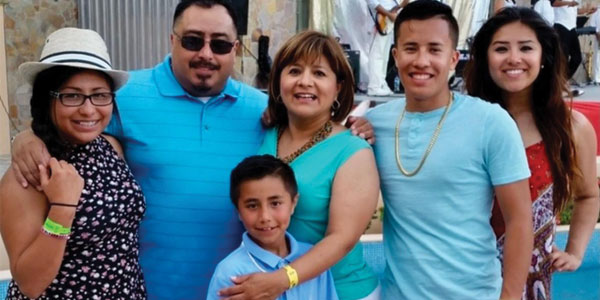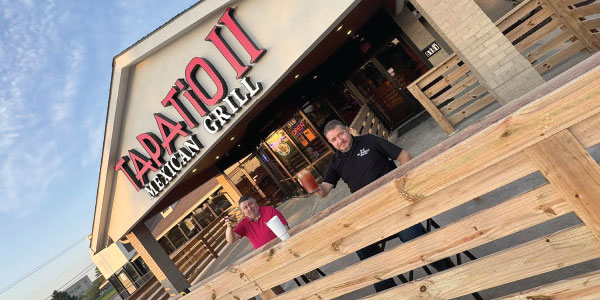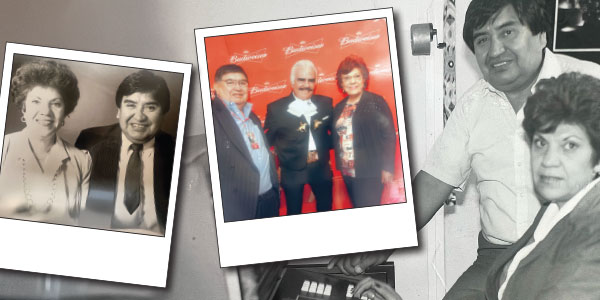
By Angie Baldelomar
Uziel Melgoza Pecina Jr. was a smart kid.
And he was always busy, whether as an Eagle Scout or as a specialized soldier in combat engineering for the Army Reserve.
“He was so confident,” his mother, Adriana Pecina, said. “He was very talented and he was good-looking and he was a great dancer and he was good at soccer and music. He played the drums, and he also worked hard and earned money at a restaurant.”
He seemed to be fine, successfully graduating high school and attending boot camp. Yet the morning before he was set to go to training in 2016, he committed suicide. He was 18.
“That was the worst day of our lives,” Pecina said.
Pecina said the family never realized he was struggling as much as he was. She compares her son’s situation to mallard ducks swimming in the water, but their little feet are pedaling hard to stay afloat.
“That was Uzielito,” she said. “He had this presence of strength and confidence and like nothing … (was) going to tear him down, but he was fighting for his life.”
Even through their pain, Pecina said the family decided not to hide the cause of death.
“We decided when we did the obituary that we needed to tell the truth, that the cause of death was suicide, so we put that in the obituary,” she said.
Suicide and other mental health illnesses like depression are still considered “taboo” topics among Latinos, particularly among the older generations. A lot of Pecina’s friends and family members questioned the need to disclose the cause of Uziel’s passing.
“We were, like, we had to tell the truth,” Pecina said. “If this could save lives, we’re OK with that.”
Serious mental illness among Latinos has increased in recent years. Around 17.2% of Latino students in grades 9-12 seriously considered suicide in 2018. Around 8.9% of students attempted suicide, according to U.S. Centers for Disease Control and Prevention statistics.
Since Uziel’s passing, Pecina and her husband have dedicated themselves to raising awareness about suicide. They volunteer for walks or fundraising events for any organizations dedicated to raising awareness about suicide.
Over the years since then, Pecina recounted that she has had people approach her to share their stories. They also have made a promise to help those who might be struggling.
“We’ve had several people in our family and friends’ network, that we have made a promise to them: If you’re feeling hopeless, if you’re feeling like you want to take your life, call us,” she said.
They have received calls during the day and even in the middle of the night, and Pecina and her husband have helped them, taking them to the emergency room. She said she firmly believes suicide and mental health in general are topics that should be discussed in daily life.
“We shouldn’t see depression as a disability,” Pecina said. “We could change the narrative, change the attitude and say: ‘It’s natural, it’s like having a cold or the flu or some kind of chronic disease, there’s help, there’s ways to overcome it.’”
Resources:
*The National Suicide Prevention Lifeline: The phone numbers are 1-(800)-273-TALK (8255), English; 1-(888)-628-9454, Spanish; and 1-(800)-799-4889, deaf and hard of hearing. It is free, confidential and open 24/7.
*Veterans in crisis and/or their concerned loved ones can call or text the Veterans Crisis Line and Military Crisis Line at 1-(800)-273-8255 and press 1.
*Prefer to text in a moment of crisis? Contact the Crisis Text Line at 741-741.
*Solace House is a center for grief and healing that supports children, individuals and families who have been affected by the death of a loved one, whether anticipated or sudden and unexpected. Call (913) 341-0318.
_________________________________________________________________________________________________________
Pecina comparte la historia de su hijo para crear conciencia sobre el suicidio
Uziel Melgoza Pecina Jr. era un niño inteligente. Y siempre estaba ocupado, ya fuera como Eagle Scout o como soldado especializado en ingeniería de combate para la Reserva del Ejército.
“Tenía tanta confianza”, dijo su madre, Adriana Pecina. “Tenía mucho talento y era guapo y era un gran bailarín y era bueno en el fútbol y la música. Tocaba la batería y también trabajaba duro y ganaba dinero en un restaurante”.
Parecía estar bien, graduándose con éxito de la escuela secundaria y asistiendo al campo de entrenamiento. Sin embargo, la mañana antes de ir a entrenar en 2016, se suicidó. Tenía 18 años.
“Ese fue el peor día de nuestras vidas”, dijo Pecina.
Pecina dijo que la familia nunca se dio cuenta de que él estaba batallando internamente tanto como lo hacía. Ella compara la situación de su hijo con la de los patos reales que nadan en el agua, pero sus pequeños pies pedalean con fuerza para mantenerse a flote.
“Ese era Uzielito”, dijo. “Tenía esta presencia de fuerza y confianza y como nada … (iba) a derribarlo, pero estaba luchando por su vida”.
Incluso a pesar de su dolor, Pecina dijo que la familia decidió no ocultar la causa de la muerte.
“Decidimos cuando hicimos el obituario que teníamos que decir la verdad, que la causa de la muerte fue suicidio, así que lo pusimos en el obituario”, dijo.
El suicidio y otras enfermedades de salud mental como la depresión todavía se consideran temas “tabú” entre los latinos, particularmente entre las generaciones mayores. Muchos amigos y familiares de Pecina cuestionaron la necesidad de revelar la causa del fallecimiento de Uziel.
“Estábamos como: teníamos que decir la verdad”, dijo Pecina. “Si esto puede salvar vidas, estamos de acuerdo con eso”.
Las enfermedades mentales graves entre los latinos han aumentado en los últimos años. Alrededor del 17.2% de los estudiantes latinos en los grados 9-12 consideraron seriamente el suicidio en 2018. Alrededor del 8.9% de los estudiantes intentaron suicidarse, según las estadísticas de los Centros para el Control y la Prevención de Enfermedades.
Desde el fallecimiento de Uziel, Pecina y su esposo se han dedicado a crear conciencia sobre el suicidio. Se ofrecen como voluntarios para caminatas o eventos de recaudación de fondos para cualquier organización dedicada a crear conciencia sobre el suicidio.
A lo largo los años desde entonces, Pecina relató que ha tenido personas que se le han acercado para compartir sus historias. También se han comprometido a ayudar a quienes puedan estar pasando apuros.
“Hemos tenido varias personas en nuestra red de familiares y amigos, a quienes les hemos hecho una promesa: si se siente desesperado, si siente que quiere quitarse la vida, llámenos”, dijo.
Han recibido llamadas durante el día e incluso en medio de la noche, y Pecina y su esposo los han ayudado llevándolas a urgencias. Dijo que cree firmemente que el suicidio y la salud mental en general son temas que deben discutirse en la vida diaria.
“No deberíamos ver la depresión como una discapacidad”, dijo Pecina. “Podríamos cambiar la narrativa, cambiar la actitud y decir: ‘Es natural, es como tener un resfriado o una gripe o algún tipo de enfermedad crónica, hay ayuda, hay formas de superarlo’”.
Información importante:
*La National Suicide Prevention Lifeline: Los números de teléfono son 1-(800)-273-TALK (8255), inglés; 1-(888) -628-9454, en español; y 1-(800)-799-4889, para sordos y con problemas de audición. Es gratis, confidencial y se atiende las 24 horas del día, los 7 días de la semana.
*Los veteranos en crisis y/o sus seres queridos preocupados pueden llamar o enviar un mensaje de texto a la Línea de Crisis de Veteranos y a la Línea de Crisis Militar al 1-(800)-273-8255 y presionar 1.
*¿Prefieres enviar mensajes de texto en un momento de crisis? Comuníquese con la Línea de texto en caso de crisis al 741-741.
*Solace House es un centro para el dolor y la curación que apoya a los niños, las personas y las familias que se han visto afectados por la muerte de un ser querido, ya sea anticipada o repentina e inesperada. Llame al (913) 341-0318.









